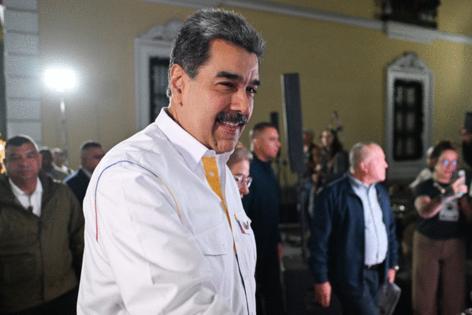US formally labels Maduro a terrorist, opening door to expanded military action
Published in News & Features
The U.S. State Department on Monday formally designated Venezuela’s Cartel de los Soles a Foreign Terrorist Organization, granting the Trump administration expanded legal authority to take military action against the Nicolás Maduro regime.
The move comes as Washington appears poised to launch a new phase of operations in the coming days amid rapidly escalating tensions with Caracas. Four U.S. officials told Reuters the administration is preparing to intensify pressure as relations deteriorate and American military assets continue to surge into the Caribbean.
While the timing and scope remain unclear, two officials said covert operations are expected to form the first stage of any escalation. All spoke on condition of anonymity given the sensitivity of the plans.
The terrorist designation, published Monday in the Federal Register, places Maduro and his top lieutenants in the same legal category as leaders of al-Qaeda and ISIS. For years, U.S. officials have long accused Maduro, Interior Minister Diosdado Cabello and Defense Minister Vladimir Padrino López of transforming Venezuela into a narco-state.
Analysts say the implications are sweeping. Because U.S. officials argue the cartel is embedded within the Venezuelan state, labeling it a terrorist organization effectively treats the entire Maduro government as part of a terror network.
President Donald Trump and Secretary of State Marco Rubio have repeatedly asserted that Maduro heads the cartel—a step that surpasses even the U.S. approach to Saddam Hussein, whose regime was accused of supporting terrorism but never formally classified as a terrorist group.
Experts believe the move could be used to unlock a potent legal tool. By tying Venezuela to terrorism, the administration could invoke the 2001 Authorization for the Use of Military Force—the law that has enabled U.S. counterterrorism operations for nearly a quarter century. That authority could allow Trump to order military strikes without first seeking congressional approval.
Caracas rejected the designation, calling it a false pretext for foreign intervention. Caracas insists the cartel is an American invention and says the accusation is part of repeated U.S. “aggressions.”
The designation, announced by Rubio, follows earlier Treasury sanctions and links the alleged cartel—said to involve high-ranking Venezuelan military and government officials—to drug trafficking.
“It is foolish for the Venezuelan government to waste part of its valuable governing time responding to these slanders and calumnies. Fortunately, the Venezuelan people are more united and cohesive than ever, tending to national affairs in all their dimensions and preparing for the Christmas festivities,” the Venezuelan Foreign Ministry said in a press release issued Monday.
The U.S. force buildup around Venezuela has been under way for more than two months. The aircraft carrier USS Gerald R. Ford—the world’s largest and most advanced—arrived in the Caribbean on Nov. 16, joining at least 10 warships, a nuclear submarine and F-35 fighter jets.
While U.S. military commanders insist the deployment supports counter-narcotics missions, the scale of the firepower far exceeds what is typically used in drug-interdiction operations.
Concerned about rising tensions in the Caribbean, six airlines suspended their routes to Venezuela over the weekend following a U.S. warning about risks to civil aviation stemming from the “increase in military activity” in the region.
Iberia of Spain, Portugal’s TAP, Colombia’s Avianca, Trinidad and Tobago’s Caribbean Airlines, Brazil’s GOL and Chile’s LATAM halted their flights to the country, according to Marisela de Loaiza, president of the Venezuelan Association of Airlines. She did not specify how long the suspensions would remain in place.
The cancellations came after the Federal Aviation Administration on Friday urged aircraft transiting Venezuelan airspace to “exercise extreme caution” because of the “worsening security situation and increased military activity in Venezuela and its surroundings.”
“The threats could pose a potential risk to aircraft at all altitudes, including during overflight, arrival and departure phases, and to airports and aircraft on the ground,” the FAA said.
Since early September, U.S. forces have carried out at least 21 strikes on suspected drug-trafficking vessels in the Caribbean and the Pacific, leaving at least 83 people dead. Human-rights groups call the killings extrajudicial executions, and some regional allies worry the U.S. may be skirting international law.
Inside Venezuela, fears of U.S. action have intensified. Maduro has long claimed Washington seeks to overthrow him, and in recent days his government has issued increasingly urgent calls for a strategy of “prolonged resistance” in the event of an invasion.
U.S. Defense Secretary Pete Hegseth said the terrorist designation “opens up a lot of new options.” Trump suggested the measure could allow U.S. strikes on Venezuelan assets and infrastructure, even as he says he remains open to negotiation.
News reports confirmed that quiet talks have taken place between Washington and Caracas in recent days. Whether diplomacy can influence what comes next remains uncertain.
Venezuelan Defense Minister Vladimir Padrino López blasted recent U.S. military activity—including exercises in nearby Trinidad and Tobago—calling them deliberate provocations.
“No threat, no air-naval deployment, however powerful or intimidating, can take away Venezuela’s right to continue on its path of freedom and independence,” Padrino said Saturday on state television. He condemned “maneuvers, exercises and deployments” in what he called Venezuela’s “immediate area of interest,” saying the nation’s patience had run out.
Tensions surged after the USS Gravely, a guided-missile destroyer, docked in Port of Spain, Trinidad, last week. U.S. Marines also conducted intensified training exercises in Trinidad from Nov. 16 to 21. Trinidad is just a few miles away from Venezuela’s Caribbean coast.
Maduro accused Trinidad and Tobago’s prime minister, Kamla Persad-Bissessar, of “pawning” her country to Washington by hosting U.S. forces just miles from Venezuelan shores. Persad-Bissessar defended the cooperation as part of a “deep and enduring” security partnership that helps curb weapons, drug and human trafficking. She emphasized that Trinidad and Tobago’s territory “will not be used to launch any attack against the people of Venezuela.”
The exercises were carried out under a bilateral Status of Forces Agreement renewed last December.
_____
©2025 Miami Herald. Visit miamiherald.com. Distributed by Tribune Content Agency, LLC.







Comments